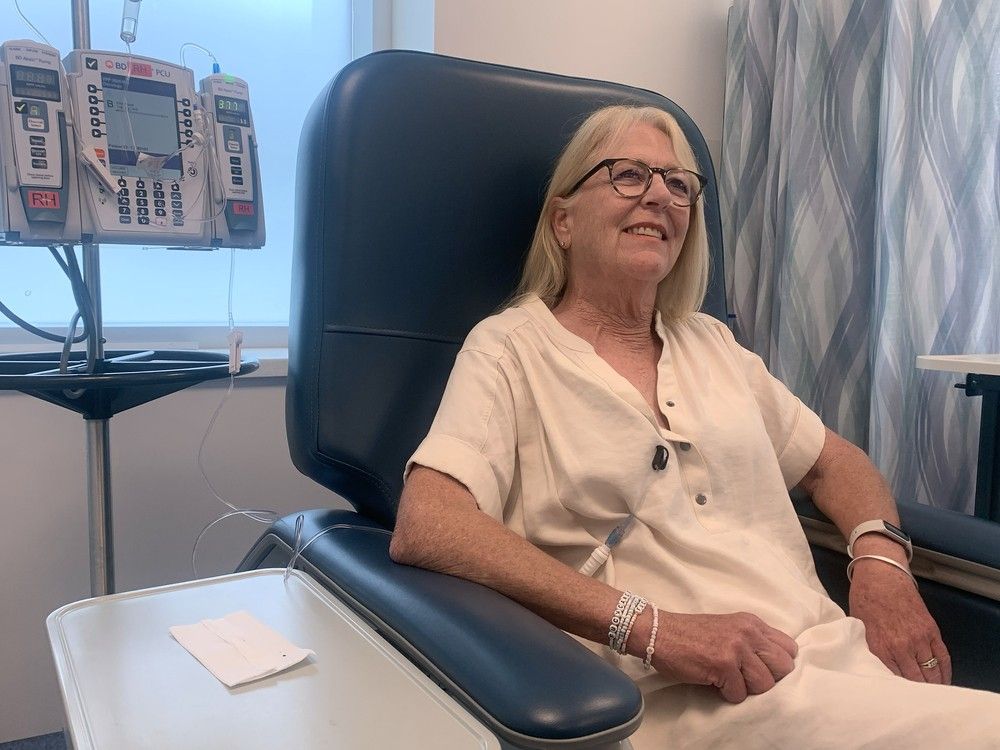
When Tsawwassen’s Sydney Cuthill began chemotherapy for the second time at Richmond Hospital, what she feared most wasn’t the treatment itself, it was what might happen in between appointments. The late-night fevers. The nausea. The unanswered questions.
That changed when the 65-year-old was introduced to a new mobile app developed by the hospital’s cancer care clinic, which prompts chemotherapy patients at home to complete daily symptom check-ins and alerts that help a nurse to follow up on concerning symptoms in real time.
“It’s so reassuring,” said Cuthill, who was first diagnosed with terminal appendiceal cancer in 2017 following a hysterectomy. “You go home with chemo attached to you through a bottle and port. For two days, you’re on your own. The app made me feel like I wasn’t.”
Since her initial diagnosis, Cuthill has undergone four rounds of chemotherapy, had her bladder and colon removed, and now lives with cancer that has spread to the lining of her abdomen. She uses the app during and after each biweekly treatment to log symptoms such as nausea, hives, and oral thrush in the following days.
“My doctor says I’ve got three years left to live. But if this chemo is what’s keeping me alive, I’m game to endure these symptoms.”
Launched a year ago as the first of its kind in B.C., the RESPONSe app supports chemotherapy patients at home. Accessible by mobile device or web portal, it prompts patients or their family members to complete a daily health check survey. Based on the responses, it either offers self-care advice or flags concerning symptoms to the clinic’s care team. A nurse monitors the dashboard daily, following up directly when needed.
Cuthill said in the past 18 months of treatment she has had symptoms she didn’t recognize as serious until the app prompted follow-up.
“After I submitted my symptoms, a nurse from the clinic called me right away and booked me in for an appointment,” Cuthill recalled.
That kind of home monitoring has allowed her to spend more time resting at home with her husband and 29-year-old daughter.
“The app makes it like someone is watching over me in real time, like there’s a nurse in my pocket,” she said. “I wish everyone going through chemo had this form of help. It really puts your mind at ease.”
Since its launch, the RESPONSe app has supported more than 500 symptom management interactions and helped reduce unnecessary ER visits. According to Vancouver Coastal Health, 100 per cent of patients surveyed said they would recommend it to others.
The app is now a core part of care at Richmond Hospital’s cancer clinic, which administers roughly 5,000 IV chemotherapy treatments each year.
Dr. Jeremy Ho, a medical oncologist at the hospital, said the technology helps close the gap between clinic appointments.
“Before this, patients didn’t always know when to call,” said Ho. “Side effects can pop up any time, and many assume it’s something to wait out. But we’ve seen this tool help catch things early, before they become severe emergencies.”
In one instance, a patient used the app to report swelling in their leg. A nurse flagged it and responded immediately. The patient was seen the same day and diagnosed with a blood clot.
“If that patient hadn’t reported it, they could’ve ended up in the ER, not knowing it was something to worry about at all,” said Ho. “Because of the app, we were able to put them safely on blood thinners and avoid a potential crisis.”
The project took more than a year to develop. Initial funding of $300,000 came from several donors, including the B.C. Ministry of Health Innovation Fund, Vancouver Coastal Health Research Institute Team Grant Award, the Richmond Hospital Foundation, and the B.C. Community Oncology Trialists. The Ministry of Health now provides ongoing operational support.
A Chinese-language version was also recently added to the RESPONSe system to make the app more accessible to local patients.
While the app requires new workflows for staff, Ho said the benefit to patients is clear.
“As a doctor, I’d want to be on this program too if I was going through chemotherapy,” he said. “It helps patients feel confident and reassured through one of the hardest journeys of their lives.”